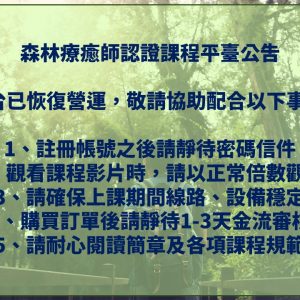- 2015.05.28
- 碩士論文
森林環境對生心理狀態效益之研究
森林環境對生心理狀態效益之研究
Physiological and Psychological Effects of Forest Environment
作者
趙彥琛
來源
臺灣大學森林環境暨資源學研究所學位論文
摘要
本研究之主要研究目標為探討森林環境以及都市環境,對於受試者生心理影響是否有顯著差異。進而探討森林環境之功效。因而選定森林環境(鳳凰自然教育園區、和社自然教育園區)以及都市環境(國立臺灣大學校園)分別作為實驗組與對照組試驗場域。生理指標採用心跳變異率,心理指標則採用大學生生活壓力量表、POMS盤斯心情量表以及SD法語意差異成對形容詞作為研究工具。研究對象部分,生理試驗挑選自願受試者大學生16名;問卷發放對象則為臺灣大學71名大學生,問卷回收後有效樣本實驗組與對照組各60份。研究分析採用敘述性統計、變異數分析以及成對樣本T檢定。
研究結果顯示,生理指標部分,16名受試者在不同環境下心跳變異率之變化(包含LF值、HF值、以及LF/HF比值)無顯著差異。心理指標部分,結果顯示不同環境下受試者於大學生日常生活壓力評價中之學校課業、人際關係以及感情/異性交往構面有顯著差異;家庭構面與人生目標構面則無顯著差異。POMS量表部分則顯示不同環境下受試者於困惑、疲勞、憤怒、緊張、沮喪、活力等六個構面有顯著差異;於自尊構面則無顯著差異。SD語意差異量表則顯示出受試者對於都市環境與森林環境有顯著不同之評價。
This study aims to explore the differences between forest environment and urban environment from physiological and psychological perspective. Heart rate variability (HRV) was selected for physiological indicator. For psychological indicators, life stress scale of college students, profile of mood state (POMS) and semantic differential (SD) scale were selected. Researchers estimated physiological and psychological effects with the indicators above at urban setting (main campus of National Taiwan University) and forest environment (Fong-Huang and Heshe natural education areas). A total of 16 students were recruited for physiological experiment. Additionally, there were 60 subjects in psychological experiment that administrated with questionnaire survey.
The result showed that autonomic nervous activity found no significant difference between urban and forest environments. Respondents reported three facets of life stress, school works, interpersonal relationships, and love life, were found significant differences. There were significant differences at six facets of POMS, they are confusion, fatigue, anger, tension, depression, and vigor. Additionally, researchers found that the students had different perceptions of campus environment and forest environment through semantic differential analysis.
本網站僅整理臺灣森林療癒之期刊文章、論文、計畫報告摘要供參考
若需閱讀全文請逕至來源、主管機關索取資料


- Copyright © Forestry and Nature Conservation Angency
- 農業部林業及自然保育署 版權所有
- 電話:(02)2351-5441
- 地址:10050臺北市中正區杭州南路一段2號

- 台灣森林保健學會
- E-mail: twforesthealing@gmail.com
- 電話:(02)3366-4637
- 地址:10617台北市大安區羅斯福路四段1號 森林系館3F
- FB 台灣森林保健學會
Copyright © 2019 All Rights Reserved.





